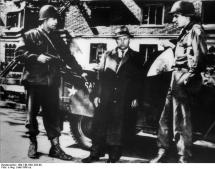
Portal on Forced Labour in the National Socialist State
zur Hauptnavigation zum Servicemenü direkt zum Inhalt
"Slave Labor" in the Nuremberg War Crimes Trials

Arresting the former "General Representative for the Deployment of Labour" Fritz Sauckel by American soldiers, May 1945
Source: Federal Archives, Bild 146-1991-033-00
The Nuremberg Military Tribunal took a clear stance on forced labour by making it to one of their charges in the category “Crimes against Humanity“ determining also the supranational scope of these crimes of the NS regime: Germans as well as citizens of other countries were forced to work like slaves.
Describing these facts of the case as slave labour was from a terminological point of view insofar a surpise as forced labour had had an internationally recognized term at the latest since 1930. At that time the international labour organisation (International Labour Organization, ILO; a permanent establishment of the League of Nations) resolved a convention on forced and compulsory labour in Geneva, which was ratified until 1945 by 18 states, amongst them being France and Great Britain. The US-prosecutors, who indeed had forced labour in the concentration camps in mind at that time, deemed this expression too weak to embrace the atrocious act of forced labour under National Socialism.
At the same time questions are arising that were to become important for the compensation policy of the following decades: Did forced labour under the National Socialist regime happen under conditions that would require a new term for it? Could it be easily compared with any known forms of forced labour? Was it thus a typical phenomenon of National Socialism? The last question in particular was negated by future Federal Governments, unless the forced labourers had been prisoners of a concentration camp.
